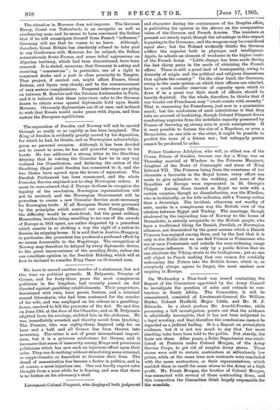The separation of Sweden and Norway will not be carried
through so easily or so rapidly as has been imagined. The King of Sweden is evidently greatly moved by his deposition, for which he had, he thinks, and as Norwegians acknowledge, given no personal occasion. Although it has been decided not to resort to arms, he has still powerful weapons in his hands. Ho has addressed a strong letter to the Storthing denying that in vetoing the Consular Law he in any way 'violated the Constitution, and declaring the action of the Storthing illegal until Sweden has consented to it, and the two States have agreed upon the terms of separation. The Swedish Parliament has been summoned, and the whole Consular Service enjoined not to obey Norwegian orders. It must be remembered that if Europe declines to recognise the legality of the revolution, Norwegian representatives will not be received, and the Norwegian Government will be powerless to create a new Consular Service most necessary for Norwegian trade. If all European States were governed by the principles which control our own Foreign Office, the difficulty would be short-lived; but the great military Monarchies, besides being unwilling to see one of the awards of Europe in 1814 upset, are rather disgusted by a precedent which asserts in so striking a way the right of a nation to dismiss its reigning house. It is said that in Austria-Hungary, in particular, the precedent has produced a profound effect by no means favourable to the Hapsburgs. The recognition of Norway may therefore be delayed by every diplomatic device, to the great inconvenience of the seceding State, unless she can conciliate opinion in the Swedish Riksdag, which will at first be inclined to consider King Oscar an ill-treated man.






































 Previous page
Previous page